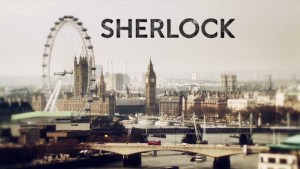Sherlock – “The Hounds of Baskerville”
“Did we just break in to a military base to investigate a rabbit?“
 The Hound of Baskerville is probably the most well known Sherlock Holmes story. Even if they’ve never read it, people have heard of the title, maybe even seen one of the over twenty different adaptations of it in both film and television. I first read The Hound of Baskerville when I was kid in what was a (probably) heavily abridged version in the Great Illustrated Classics line, with an illustration opposite each page of text. It was among my favorites of those (I had a large chunk of the collection at the time), and Hound was for me, quintessential Holmes (never mind that I would never get around to another Holmes story for decades).
The Hound of Baskerville is probably the most well known Sherlock Holmes story. Even if they’ve never read it, people have heard of the title, maybe even seen one of the over twenty different adaptations of it in both film and television. I first read The Hound of Baskerville when I was kid in what was a (probably) heavily abridged version in the Great Illustrated Classics line, with an illustration opposite each page of text. It was among my favorites of those (I had a large chunk of the collection at the time), and Hound was for me, quintessential Holmes (never mind that I would never get around to another Holmes story for decades).
With the second season of Sherlock, there was a conscious effort to do the big, famous Holmes stories on the part of Moffat and Gatiss. As we saw last week, tackling those big stories is a daunting task, one rife with pitfalls of interpretation and faithfulness. And after the muddled result of “A Scandal in Belgravia”, I was a little worried about how Hound would survive the transition, not only because this is a story I have nostalgic attachment to (always a complicated issue to navigate) but because of the previous week’s efforts.
Apart from truly horrible CGI at the end (I mean truly truly horrible, like the greenscreen in Ringer‘s pilot is more convincing horrible), “The Hounds of Baskerville” is a very good episode. In fact, I’d go so far as to say that like “A Study in Pink”, “The Hounds of Baskerville” manages to be enjoyable and update and tweak the general idea of the story while remaining true to the overall mood and spirit.
Indeed, if there were ever a case that captures horror and the supernatural, it was The Hound of Baskerville, and here with “Hounds”, we keep the horror and replace the supernatural with science fiction, and it all still works. In fact, the episode is genuinely frightfully for the first hour or so (before you kind of figure out it’s all caused by some sort of hallucinogenic substance, and then you’re just trying to figure out what the substance is). And it does it in effective ways.
Scaring Sherlock is definitely one way to do it, and between Cumberbatch’s performance and the cinematography (deep focus or a composite shot) during his breakdown in the inn’s lounge, I was pretty much on board with the horror. The notion of Sherlock “seeing it”, and his own emphasis on that, does help create the notion that the hound is real: Holmes trusts his eyes implicitly, and because we’re given his view of the world through graphic overlays, we trust his eyes, too.
And while it’s a little less showy, watching Henry (I see what you did there, casting choices) deal with the flashing motion sensor lights was perhaps the most actually scary moment since Henry’s stability is a little more of a question. Plus they keep blinding us with those damn lights. And as I’m finishing this up, there’s a Twitter discussion raging about Henry and Tovey’s performance (the latter had a bad accent, the former had little to do in the story). The accent seemed spotty, and Henry didn’t have much do beyond look exhausted, but I’m generally okay with that.
Perhaps my enjoyment of the episode stems from the nostalgia I have attached to this story. I didn’t mind the dropped prisoner plot (but appreciated the quick mention, and the episode still incorporating the signal light in a clever way, one that provides Sherlock with a new way of looking at the case) nor that the original culprit was turned into a tour guide who doesn’t have a wife posing as his sister. Instead it felt updated and fresh, in the way that series has proven itself capable of doing, including with the previous episode.
For the next episode, I have no such nostalgic attachments to the source material (indeed, I don’t particularly like the source story), so perhaps I’ll be a bit more even-keeled. The end of this episode, with the ‘Sherlock’ scratched all over what I assume is a government-ran funny farm room, does set us up for the central conflict of that story, and hopefully to pay off last season’s finale.
- January 12, 2012
- Noel
- Episode Review
- Sherlock

